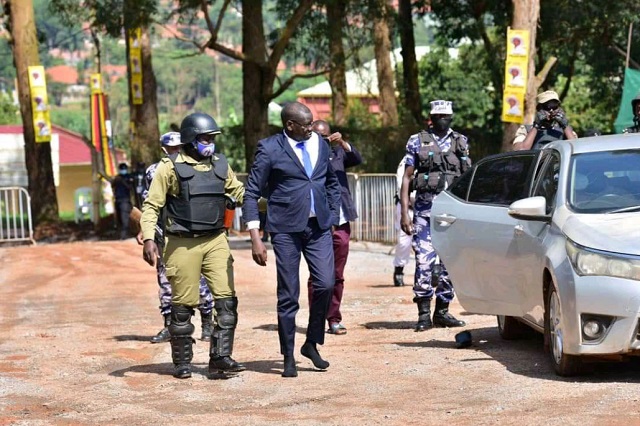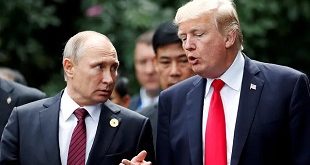
So why does President Museveni ignore it?
Uganda, Uganda | MUBATSI ASINJA HABATI | Since scenes of violence being meted out in broad daylight against the most prominent presidential candidates challenging President Yoweri Museveni, most commentators and analysts have said the violence sets stage for the 2021 elections.
Presidential nominees Robert Kyagulanyi aka Bobi Wine and Patrick Amuriat Oboi were on Nov. 03 roughed up by security forces, mostly men donning police uniform.
In the most comic mockery of the electoral system in this country, the Forum for Democratic Change (FDC) presidential candidate Patrick Amuriat arrived shoe-less and bruised to be nominated after police brutalized him.
“The police kidnapped me,” Amuriat told journalists at Kyambogo University Cricket Ground where the Electoral Commission held the nominations of presidential candidates instead of the traditional Namboole Stadium which is now housing a makeshift hospital for COVID-19 patients.
“I am here against my will. The police forcefully brought me here,” Amuriat emphasized.
The police also attacked National Unity Platform (NUP) presidential nominee Robert Kyagulanyi aka Bobi Wine soon after he got nominated violently breaking his car glasses and forcefully removing him from his car and bundling him into a waiting police van –which is nick-named the Besigye Van to imply the number of times the police have forced the opposition strongman Kizza Besigye have put him into that van each time they arrested him.
The Nov.03 brutal arrest of Bobi Wine happened under the watch of the Electoral Commission chairman Justice Simon Byabakama and his team at Kyambogo University grounds. In the ensuing fracas, the police tore suits of some of Bobi Wine’s aides leaving others with injuries.
Justice Simon Byabakama condemned the police actions and promised to hold a meeting with security leaders to chart a way forward. President Yoweri Museveni and the police leadership under the Inspector General of Police, Ochola, have remained silent over the two incidents.
But political observers have no kind words for police and other security agents’ violence on presidential nominees.
The Coordinator of the Citizens’ Coalition for Electoral Democracy in Uganda (CCEDU) Charity Ahimbisibwe said the violent behaviour of security forces on opposition candidates during elections is against the spirit of rule of law.
Scaring voters
Some, like Sheikh Abdul Kayimba of Mbarara, say such brutal arrests of presidential candidates serve to intimidate voters.
“If the police continue to violently arrest opposition politicians especially presidential candidates, it sends signals of fear among the population, and eventually affects the voter turnout,” said Sheikh Kayimba, “people won’t vote because of fear.”
Sheikh Kayimba was speaking at a meeting of religious leaders in Mbarara with leaders of the Inter-religious Council of Uganda. They all condemned the actions of the police.
And Kayimba could be right. The most violent elections of 2001 where UPDF’s Major Roland Kakooza Mutale freely roamed the country beating up Besigye supporters returned the lower voter turnout of 70.3% as compared to 72.9% in 1996.
In 2006, again where security forces, including the Black Mambas Urban Hit Squad led by Gen. David Tinyefunza, then coordinator of security services and presidential adviser, and Col. Leo Kyanda, then Chief of Military Intelligence, meted out violence on opposition supporters and candidates, voter turnout was 69% and reduced further in 2011 at 59%.
In 2005 and 2006 armed men and police guarded NRM supporters putting up NRM posters and taking down FDC ones at night, and opposition leaders Kizza Besigye, Winnie Byanyima, Jack Sabiiti, Reagan Okumu, Michael Ocula, Ingrid Turinawe, Muwanga Kivumbi were sent to jail on tramped up charges ranging from terrorism, treason, sedition, rape, murder, and libel.
But instead of condemning, the police brutality, President Museveni appeared to speak in support. After his nomination as a candidate on Nov.02, Museveni said that his government would not tolerate the activities of enemies he did not name who are allegedly plotting chaos.
“There’s nobody who is going to disturb here. Whoever tries, will regret. Because for us, we don’t play,” the president said.
“NRM fought to bring peace in this country. Nobody has more guns than us. But we don’t scare people,” he added.
Museveni’s failure to condemn the brutality of the security continues to puzzle many observers although it has been going on for a long time.
 The Independent Uganda: You get the Truth we Pay the Price
The Independent Uganda: You get the Truth we Pay the Price




Under normal, a free society and democratic dispensation, to the citizens, the government is supposed to be the paid, respectful and loyal servant. But in our Uganda case, it is the other way round. It is the servants who beat up, starve and kill the Master.
As a result, public servants live in obscene luxury like Kings, Queens, Princes/s and/or Nobles: they are nasty, obnoxious and driven at high speed in luxury vehicles, escorted by a motorcade of sirens and armed police/military guards. Meanwhile the citizens who pay them work like slaves, sleep tired, hungry, sick and at the mercy of their Royal Servants .
And on many occasions cry out: “Gavumenti atuyambe”.
In other words, it is not only during the election cycles, but almost every day of the year; that state terrorism, intimidation and/or violence on Ugandans is by design. Otherwise, why should the Uganda Police and the military contentiously beat up and shot at Ugandans over minor infraction or rules, committed out of curiosity?
No wonder Mr. Museveni categorically said that his is nobody’s servant or employee. Meaning: he is the Master and Royal King and Ugandans are his slaves and servants.